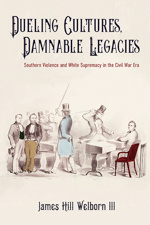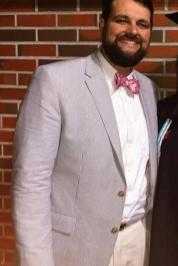Today, we are happy to bring you our conversation with James Hill "Trae" Welborn III, author of Dueling Cultures, Damnable Legacies: Southern Violence and White Supremacy in the Civil War Era.
What inspired you to write this book?
As an M.A. thesis turned PhD dissertation turned monograph, it all started with a simple question: “what’s in the water in Edgefield, S.C.?” As the self-proclaimed “Home of Ten Governor’s” and birthplace of many infamous politicians from Preston Brooks to Ben Tillman to Strom Thurmond, I sought to better understand this place and its people that figured so prominently in shaping the history of the state, region, and nation. A cultural duality between a pronounced masculine honor culture developing alongside an equally prominent Protestant Evangelical culture in Edgefield during the nineteenth century quickly became apparent, and explaining the dynamics of that emergence and evolution through the Civil War Era among members of particular Edgefield families as they engaged with and in the era’s pivotal issues and events became the focus of the book.
What did you learn and what are you hoping readers will learn from your book?
The centrality—and complexity—of emotions increasingly stood out as I sought to understand various members of these Edgefield families and their worldview. In focusing on individual and collective identity and ideology formation and evolution, the book reveals a deeply personal, emotional context for familiar issues related to sectional conflict, Civil War causation, and the consequences of both in history and memory. In doing so I hope it bridges gaps between macro-level conceptions of sectionalism and the causes, courses, and consequences of the Civil War and the micro-level centered on personal and emotional experiences of those historical developments on the ground among individuals, their families and communities. This project evolved into a more concerted work of emotions history than initially anticipated, which enhanced the value of its analysis immensely.
What surprised you the most in the process of writing your book?
The most compelling—if not wholly surprising—aspect of the project were the frequent parallels between prevailing white southern mores during the Civil War Era and those coursing through current contentions over issues of race, identity, and ideology in U.S. society and culture. The violent rhetoric and action among white southerners who sought to perpetuate white supremacy during the Civil War Era resonates with chilling similarity and frequency in many modern expressions of white Christian nationalism. One letter from a South Carolina constituent of Preston Brooks to Charles Sumner following the infamous 1856 caning captures these striking parallels most vividly in threatening a proslavery, anti-abolitionist march on Washington with much the same tone and fervor later exhibited in the January 6, 2021 capitol riot.
What’s your favorite anecdote from your book?
The exchange in chapter four between Iveson Lewis Brookes, a Southern Baptist minister, to his son Walker concerning Walker’s recent confessions to frequent engagement in the “solitary vice” (masturbation) is both humorous and telling. The intensely personal and intimate nature of the exchange, combined with intensified sectional animosity surrounding it, vividly captures the close association, perceived and real, between individual and collective identity and ideology in these sectional conflicts. Certainly, the exchange appears humorous from a modern vantage point, as the prospect of a preacher’s son admitting his masturbatory mania to his father could be a sketch comedy act. But the gravity with which Walker confessed his self-described sin, and the equally serious tone in which his ministerial father responded with counsel, consolation, and censure, reveals much about their respective and collective worldview and value system.
What’s next?
New writing projects already underway mine veins initial encountered in the research and writing of this book, including an article-length study of “rhetorical duels” between southern ministers in the antebellum Christian press tentatively titled “Cross Words,” and a book-length examination of southern students at northern seminaries during the height of the antebellum sectional crisis tentatively titled “In the Lion’s Den.” A longer-term project tentatively titled “Tailgating with Jesus” will expand the chronological and topical scope of my research inquiries beyond the Civil War Era and even Civil War memory toward a broader investigation of southern cultural mores as manifested in the religious rhetoric and ritual associated with “big-time” southern college football. I also continue to expand research into southern foodways, including especially oral history and digital history projects on barbecue culture.





